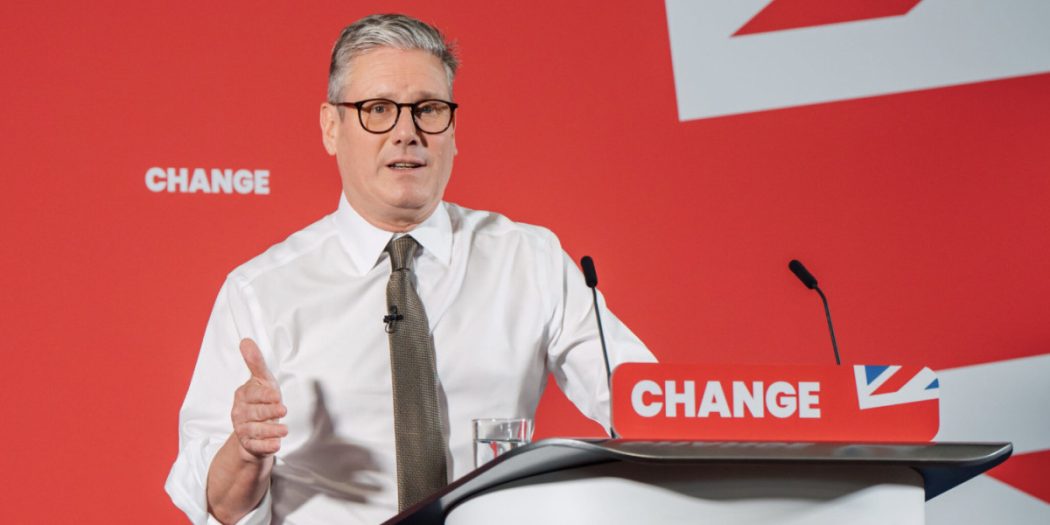
The UK’s Labour Party is considering reorganising the remit and duties of key departments to galvanise the government and address the most pressing economic and societal challenges facing the country.
Yet to pull the trigger, Prime Minister Keir Starmer is assessing a strategy to prevent smaller parties from growing in prominence and taking council seats and constituencies – particularly the Reform UK Party, led by Nigel Farage.
British media reports that last week’s local election results are a wake-up call for Labour strategists, highlighting the threat posed by Farage’s Reform Party and its growing popularity both within Labour strongholds and in historic Conservative heartlands.
The local elections were described by Farage as “another sign of the British public breaking away from the status quo”, as Reform won 32% of the vote surpassing both Labour and Conservative camps and capturing 677 council seats and 10 councils.
Labour insists it will not panic at the local results, as Reform still holds just five seats in Parliament following the 2024 general election, a level of representation that does not place it among the top five parties in UK politics.
Yet, aware of Farage’s threat, Starmer requires a strategy to draw attention away from Reform and maintain public focus on Labour – and the chaos surrounding a hapless Conservative Party under the leadership of Kemi Badenoch.
The Sunday Times reports that Starmer has tasked his principal strategist, Morgan McSweeney, with crafting a new narrative for Labour to demonstrate its focus on tackling major issues and delivering change.
Credited as the lead architect of Labour’s 2024 general election victory, McSweeney acknowledged “a big gap between politics and the people in this country,” adding: “They’re not going to accept us until we’ve actually delivered change.”
Assigned to halt the decline since Labour’s general election victory, McSweeney is expected to advise Starmer to call for a cabinet and departmental reorganisation. The focus will be on addressing a stagnant UK economy, deteriorating healthcare services, social issues such as crime and education, and public anxiety over migration.
A new departmental strategy will see the Department for Education reorganised by Starmer loyalist Peter Kyle, replacing Bridget Phillipson, due to dissatisfaction with her handling of school reforms.
What has caught the media’s attention are rumours that Labour strategists may call on Starmer to abolish DCMS entirely and distribute its duties across other relevant departments.
The termination of DCMS would remove Lisa Nandy, Secretary of State at the department, from the cabinet. Other ministers with roles in DCMS include Chris Bryant MP, Stephanie Peacock MP, and Baroness Twycross, who currently oversees the concluding stages of the UK Gambling Review.
The dissolution of DCMS would come at a sensitive time for UK gambling stakeholders, as they await the full implementation of regulatory changes recommended by the Gambling Review – a five-year process still under deliberation and oversight by parliamentary select committees.
In 2025, DCMS and the UK Gambling Commission (UKGC) scheduled the rollout of several key measures:
However, departments have yet to finalise the application of financial vulnerability checks (currently in the second phase of testing), reforms to land-based gambling, and the remit of the proposed Gambling Ombudsman. These changes could also disrupt the UKGC’s lead GamProtect project, which aims to establish a single customer view of gambling harms and accountability.
The Sunday Times noted that if DCMS were to be split, its regulatory and industry oversight functions would be transferred to the business and treasury departments, while social initiatives would fall under the remit of education and welfare departments.
This is not the first time the DCMS remit has come under scrutiny during what has been a disruptive decade for UK politics.
Former Prime Minister Rishi Sunak considered a significant restructuring of DCMS responsibilities but ultimately opted only to remove science and technology oversight, creating the new Department for Science, Innovation and Technology (DSIT).
The Conservative government intended for DCMS to operate with a narrower focus, reducing its overall political portfolio to concentrate solely on culture, media, and sport.
Upon winning the general election, Starmer stated that he would stabilise the department after years of inconsistent leadership under the Conservatives. In fact, DCMS saw 14 different secretaries since 2010 – a symbol of the “constant chaos” that reigned over the department.
At present, DCMS continues to oversee a demanding regulatory agenda including
While many agree that the DCMS is in need of significant reform, concerns are likely to arise over dismantling a governing institution that has existed since 1992, and grown in political significance greatly in the decades since.
The department’s effectiveness and expansive remit have been repeatedly scrutinised by successive governments, particularly as it has become entangled in divisive culture war conflicts.
However, dissolving DCMS purely to alleviate political pressure from the Reform Party would raise serious questions about Starmer’s motives – and whether such a drastic move is truly necessary simply to “change the narrative.”